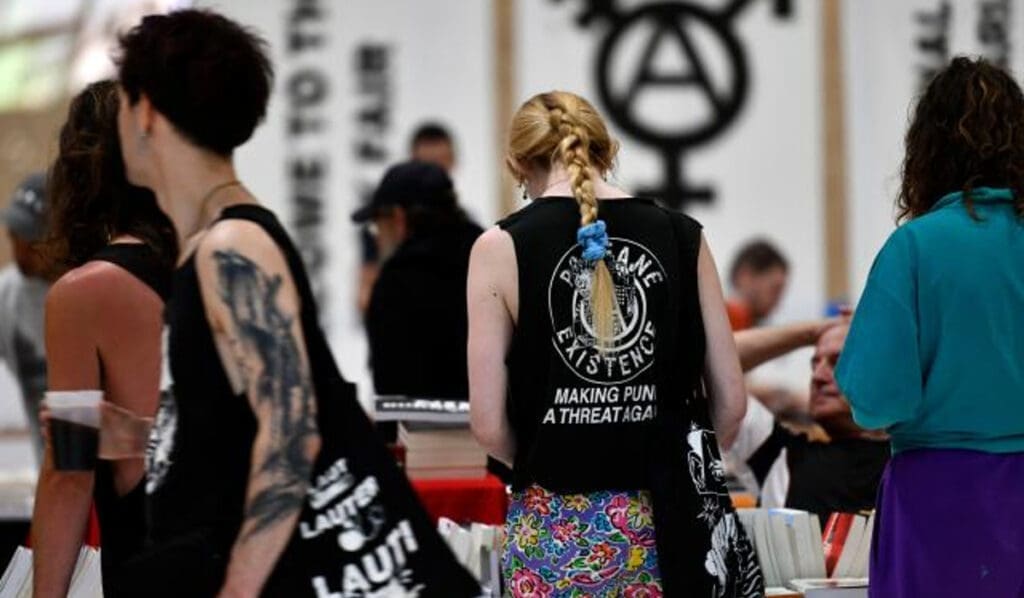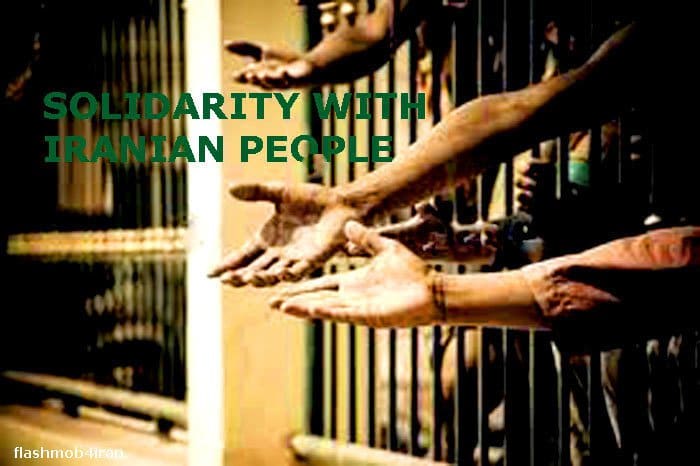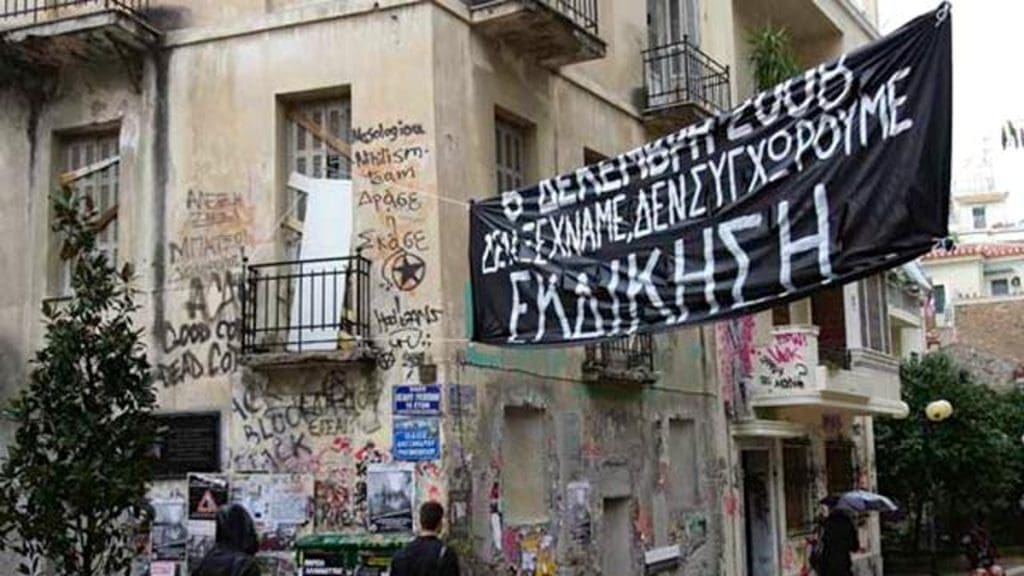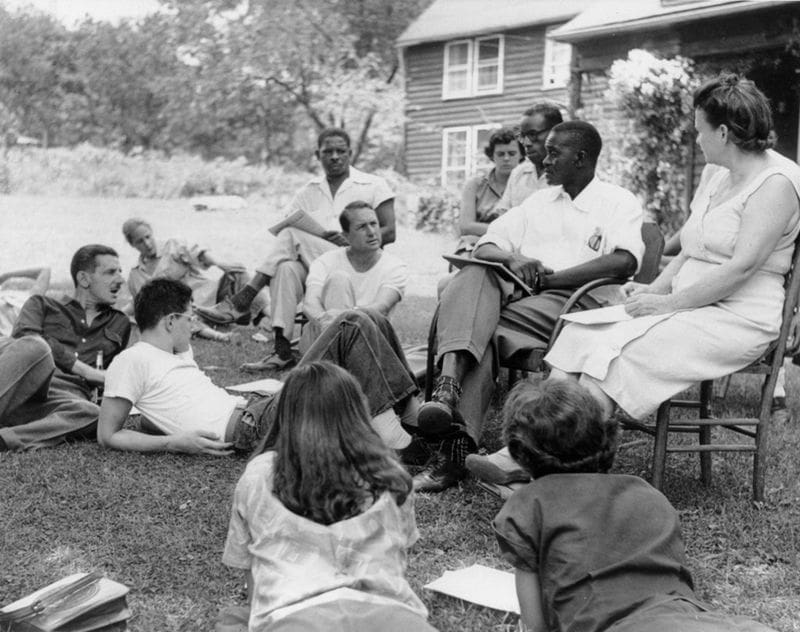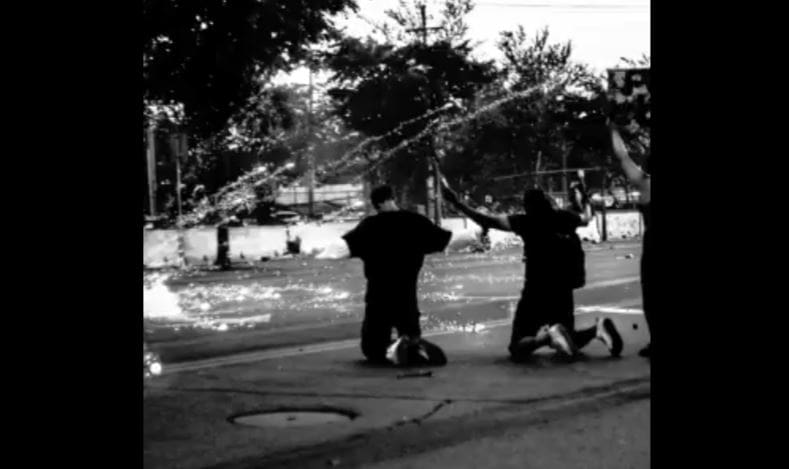When in Doubt, Do
“Anarchy 2023” and the case for praxis
by Anna Jikhareva and Kaspar Surber for Die Wochenzeitung (Switzerland)
3 August 2023 (original post in German)
The 150th birthday of the Anti-authoritarian International was just celebrated in Saint Imier, Switzerland. The global power of anarchism was on display – at least some of the time.
The bare-walled community room of the vacant Saint Imier old folks’ home is filled to capacity. The energetic drumming of Rhythms of Resistance, a percussion band that provides musical accompaniment for demonstrations, thrums in from outside. There is a devotional vibe here indoors, however: the roughly fifty attendees are standing to observe a moment of silence “for Dima and all the others who have died in Ukraine.”
Once everyone has retaken their seats, companions of the Muscovite Dmitri Petrov share stories of his impressive life. His parents, who traveled here especially for the occasion, also share memories. Petrov fought for Ukraine against the Russian invasion; he was killed in April in the battle for Bakhmut. A historian, he co-founded the militant anarcho-communist combat organization “Boak” in Russia, later took part in the revolution for dignity on the Maidan as well as the popular revolt against the Belorussian dictatorship in Minsk, and lived for several months in Rojava, writing two books about it. “Before standing for a utopia, he wanted to see it for himself, all the good and the bad,” says a friend.
Dmitri Petrov’s life story is rich in examples of an anarchism that regards itself as internationalist – that respects no Gods and no Masters, after the old saying, and certainly no so-called “Fatherland.” But how globally is the movement thinking and acting today, all things considered?
“They’re sort of dreamers…”
“Anarchy 2023” is a good place to pursue this question. Around 150 years ago here in the Jura region of canton Bern, a group around Mikhail Bakunin, Errico Malatesta, and the Swiss watchmaker Adhémar Schwitzguébel founded the Anti-authoritarian International. The congress is still regarded today as the birthplace of anarchism.
An estimated four thousand people who identify as anarchists, or who may simply belong to the extra-parliamentary left, traveled to Saint Imier for a new edition of this congress in mid-July. Due to COVID, the anniversary celebration had been postponed one year. The city opened many of its public buildings for the five-day conference: the anarchist book fair is housed in the hockey stadium, concerts by bands like the Kumbia Queers are taking place in the exhibition hall, and alongside the memorial service for Petrov many additional workshops are being held in the former retirement home. Altogether there are well over three hundred different events.
The banners of various groups flap in the wind over the gently sloping field where participants have pitched their tents; vegan dishes simmer in the pots of several large communal kitchens. An anti-authoritarian spirit keeps popping up in the streets of Saint-Imier these days: two musicians – banjo and accordion – practice their version of a squatter’s anthem on the front stoop of a building: “This is our house, you won’t get us out” echoes through the streets. In the middle of a crosswalk, a young man is making a game of holding up a large police vehicle with abstract, flowing dance moves. The transporter van is stuck there for several minutes; patio diners at a nearby brasserie look on with amusement.
“They’re all well-behaved and clean,” says the town bakery’s cashier of the visitors. “Though they might be sort of dreamers.” Her calm in the face of the anarchists’ incursion is of a piece with the general mood in the town: there is definitely a sense of pride around the world history that once took place here. “The congress brings attention to these historic events, and that’s good for Saint Imier,” remarks the town’s right-libertarian mayor to the cameras of the Swiss national public television station. Overall the media has covered the conference positively, coming as it has during the summer slump in news—although many reports have gotten stuck in descriptions of anarchists as an exotic subculture.
In a presentation held in a large theater, before an audience numbering in the hundreds, historian Florian Eitel explains to the congress why anarchism found resonance in the newly industrialized valleys of the Jura mountains. He speaks of the “parallel histories” of economic globalization and the spread of anarchist ideas: new technologies like the railroads and the telegraph radically changed perceptions of time and space, and thus helped create a new conception of international solidarity.
“Where’s our watch?”
Among those who traveled the furthest to get to “Anarchy 2023” is Adriano, who together with his friends Timo and Julio make up the unofficial Brazilian delegation. Comrades from Europe helped finance their plane tickets. The significance of Saint Imier is known worldwide, says Adriano in the ice arena’s adjacent cafe and bar. He knows about it from a reading group on the history of the workers movement. “Of course we were expecting a Swiss watch as a welcoming gift,” Timo interjects. The others laugh.
The three want to fill some gaps in their own anarchist library from the book fair in Saint Imier – as well as network with other groups, especially those who also came here from Latin America. “Of course, Brazil has different issues than Europe,” says Adriano, “especially around the question of just land distribution.” In addition, one must not forget that Brazil was the last country in Latin America to abolish slavery. “In our struggles, therefore, even today, it’s less about classic labor campaigns and more about social self-defense in a racist society.”
Questions, therefore, to which direct answers do not abound within the historical works of anarchist authors from Europe. “And yet, the methods of anarchism are very adaptable to the work in our communities,” says Julio. “We want to create spaces free of hierarchy and coercion,” adds Timo. In Saint Imier, above all they want to gather practical knowledge. “Saber fazer” is the Portuguese expression: know, in order to do.
Alongside the English lingua franca at the congress, these days in Saint Imier one encounters a true tangle of languages: Portuguese, Italian, Russian, and of course a lot of German. Heike and Tom, like many others, have come here from Berlin – buses were chartered from the German capital. These two have been active for many years in solidarity projects with Latin America, and are excited about getting to meet like-minded comrades from the Global South.
“A conference like this brings the utopia of anarchism out of the ivory tower,” says Heike. “In the global context, these ideas achieve real meaning.” In conversations with groups from countries already more deeply affected by global warming, she says, one can learn a lot more about the concrete struggles trying to avert climate catastrophe. “And at the same time, you’re made more aware of your privilege here in Europe, and of the necessity of solidarity.”
Since the organizing team consists of only a few volunteers who are constantly seeking additional hands to keep the conference running smoothly, both Germans are helping in the kitchen. They have peeled mountains of kohlrabi which had been planted two years ago nearby specifically to feed congress-goers. “Through this kind of self-organization, the conference makes good on its spoken political demands,” says Tom. The gathering is a little white and elitist, though, add the two self-critically.
Yodeling Against the Right
Just how arrogant the Western perspective can be, even among anarchists, must be especially apparent to participants from Russia, Belarus, and Ukraine. At practically every workshop about the Russian invasion, there are impromptu lectures about “real anti-militarism.” At a panel discussion about anarchist positions on war, a German participant prominently displays a sign with the slogan “Against All Wars.” In her opinion, anarchists in Ukraine should not be taking up arms.
“When your country is attacked by an imperial power, you no longer have time to wait for the ideal social revolution,” says a Ukrainian. “You have to defend yourself.” An anarchist from Belarus complains: “Western comrades prefer to see us as victims. When we try to share our perspectives, we get disparaged, and over and over again its like, we haven’t read enough this or that. Our struggles aren’t exotic enough for you, like those of the Kurds or the Zapatistas—but we’re also not on the same level as you somehow.”
For every earnest discussion like this in Saint Imier, the entertaining side of anarchism is on display as well. This has a lot to do with how many in the movement place praxis before theory, much in the sense of the Portuguese “Saber fazer.” At the congress one can learn how to make etchings using aluminum cans, which knots to use for climbing during political actions, and there’s even a workshop on anarchist yodeling.
This can be useful to cause fash to fall out of step at rightwing demonstrations, explains the Berlin duo leading the workshop, Esels Alptraum [Dumbass’s Nightmare]. Both women are wearing wigs, dirndls, and full ammo belts. To begin the class, they intone: “Love, Freedom, Anarchy!” The rest is just yodeling.
Die WOZ is devoting issue 28/23 to coverage of anarchism past and present. More articles (in German) here.
Translated by Antidote
Featured image via die Wochenzeitung. Photograph by Hélène Tobler

